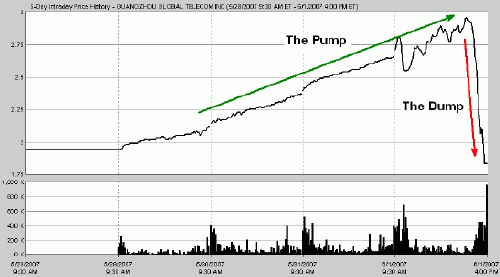A couple days ago I was reading Investors Business Daily and something caught my eye – no it wasn’t a great piece on technology trends or the next hot company. It was a full page ad from growthstockguru.com promoting a pink sheet penny stock, Guangzhou Global (GZGT)! I read a lot of financial publications and don’t ever recall seeing a full length ad with the same kind of flashy promotion you get in your junk email. Is the desperation for ad dollars this great? To me it’s unbelievable that respected publications like Investors Business Daily would put their credibility on the line for a few bucks like this. IBD isn’t the only one. Apparently Forbes, Fortune and BusinessWeek were running these ads as well but I haven’t seen them. The IBD ad is right in front of me on page A13 of the Friday edition (the ad is running yet again on page A15 of the weekend edition). Shame on you IBD and other publications for being a part of the stock spam problem and not a part of the solution. How do you live with yourselves knowing that some of your readers may have naively jumped into this stock before the big dump.
The IBD ad ran in the Friday edition. After all the pumping from these slick ads, Guangzhou Global (GZGT) began the big dump with a little more than an hour to go in trading Friday. A nearly 38% drop.

chart via MSN
I would like to commend Kiplinger’s for being responsible and not running these ads. According to Thomas Anderson of Kiplinger, they were also approached and declined to run the ad. There is some interesting background in this article about the relationship between growthstockguru.com, GZGT and the advertiser as well as the financials of the company. Some highlights:
– The editor of growthstockguru.com, Aharon Bronfman doesn’t show in a search of private and public databases. It’s entirely possible this person doesn’t even exist! Do a search in Google and you’ll see what I mean. Fifteen years of investment experience and this guy is invisible? Also interesting to note that the website went online just days before GZGT started trading. So much for the hype in the ad that claims Aharon’s 3 recent stock picks went on to extraordinary gains.
I’ve taken this a step further and uncovered the following:
– The listed address for GrowthStockGuru.com is
Growth Stock Guru
1461 A First Avenue, # 360
New York, NY 10021-2209
USA
If you do a Google search for the address 1461 A First Avenue, #360, New York, NY 10021-2209 you start seeing other unsavory companies with the same address such as
– A Witherspoon, Seymour & Robinson Inc which looks to be a fairly shady company in its own right.
– Is it coincidence that another investing site tradesoeasy.com with rumored links to a german spammer has the same address? I think not. It appears that the address used by growthstockguru.com and many other unscrupulous companies is some sort of address forwarding service.
It’s unclear just who owns what and all the parties behind the pump and dump scheme.. but the bottom line is that Business Week, Forbes, Fortune and Investors Business Daily, whether they realized it or not, all were a part of that. That is mighty disturbing. Could they not do a simple background check as I have done and realize this was most likely a classic pump and dump scheme? Or was the desperation for ad dollars too great to pass up?
I don’t have the time or resources to research this any further but the moral of the story is to be careful out there avoid those pink sheet stocks!
 Seriously though, this is just one ripple affect on food prices. The demand for ethanol will undoubtedly lead to inflation across the entire food supply as acreage for other food supplies shrink and feed for animals skyrockets. How bad is it? It has become so expensive to feed their livestock corn based feed that one farmer is feeding his livestock cookies, licorice, cheese curls, candy bars, french fries, frosted wheat cereal and peanut-butter cups! Another farmer in Idaho is feeding them tater tots!
Seriously though, this is just one ripple affect on food prices. The demand for ethanol will undoubtedly lead to inflation across the entire food supply as acreage for other food supplies shrink and feed for animals skyrockets. How bad is it? It has become so expensive to feed their livestock corn based feed that one farmer is feeding his livestock cookies, licorice, cheese curls, candy bars, french fries, frosted wheat cereal and peanut-butter cups! Another farmer in Idaho is feeding them tater tots! 